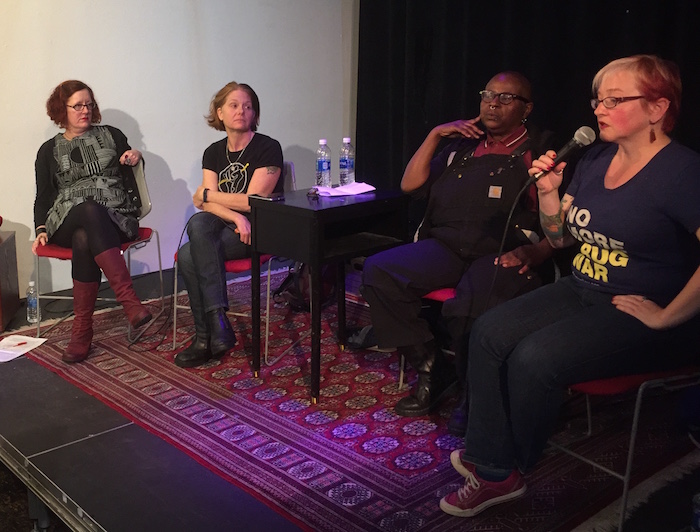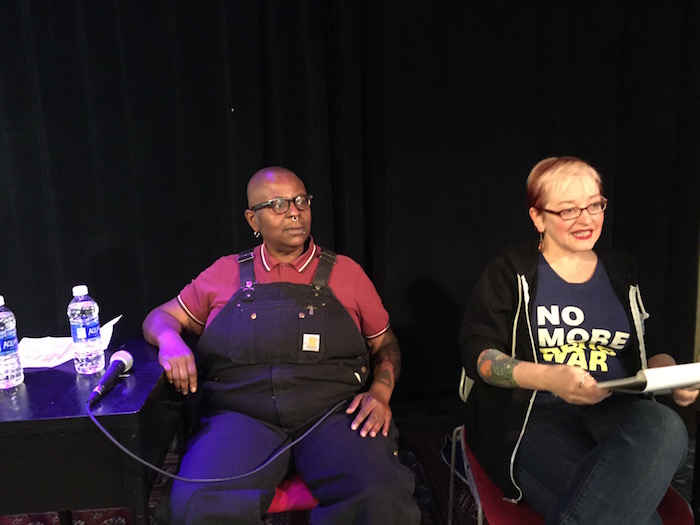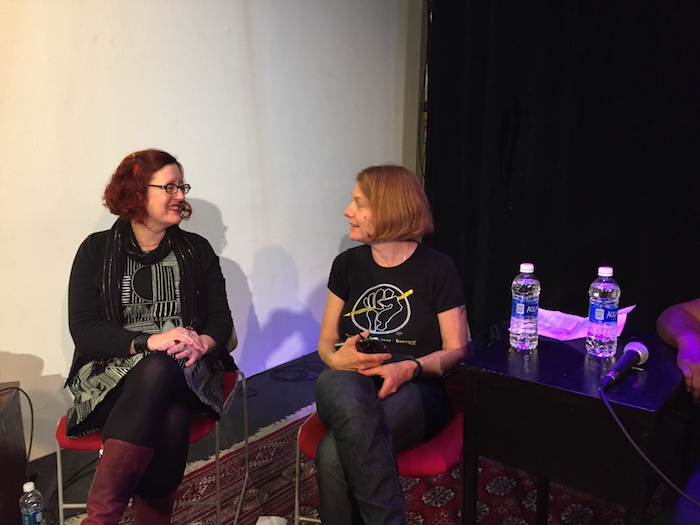
All four presenters at ACT UP workshop hosted by Godless Perverts on Jan 9, 2017. Left to right: Ingrid Nelson, Rebecca Hensler, Crystal Mason, and Laura Thomas.
The ACT UP workshop hosted by Godless Perverts on January 9 was a huge success! It was standing room only at the Center for Sex and Culture, all the more notable with the weather being so bad. We actually had to turn people away at the door. (A nice problem to have, but still a problem: we apologize again to anyone who wasn’t able to get into the workshop, and we hope to have another one soon.) And the feedback we’ve gotten has been overwhelmingly positive. It’s impossible to summarize the entire workshop in one blog post — we made an audio recording of the event, which we’ll post as soon as possible — but here are a few highlights.
Co-hosted by the GLBT Historical Society, “How ACT UP Fought Back: Direct Action and Civil Disobedience” was presented by Rebecca Hensler, Crystal Mason, Ingrid Nelson, and Laura Thomas. All four talked about how they first got involved in ACT UP — and strongly emphasized that ACT UP members were largely self-taught. You learn activism by doing it, they said. One of the main obstacles to activism is the idea that you have to be an expert to do it — a myth that all the workshop presenters strongly opposed. On that note, they emphasized the importance of activists being willing to learn: part of what made ACT UP effective was that they sought out information about medicine, science, technology, past resistance movements, and more, from experts, books, films, and from one another. And the presenters pointed out that not everyone can do street protests and get arrested — and not everyone has to. There are jobs for everyone in direct action.

Crystal Mason and Laura Thomas at “How ACT UP Fought Back” workshop
The Successes of ACT UP
ACT UP was one of the most successful activist movements in recent history, and the presenters spoke movingly of both their successes and failures. At the time they were most active, AIDS and HIV were being largely ignored by government, media, and the medical establishments. Simply getting these people to break the silence and stigma, even getting them to just say the word “AIDS,” was in itself a victory. But their successes moved far beyond that: ACT UP had major impacts on medical protocols, government policies, insurance coverage of HIV drugs, media reporting about the epidemic, and public perception of people with AIDS and HIV. Sometimes their activism took months or years to create change: sometimes the effect was almost immediate. There are lots of reasons for this success: they did a good job of centering people with AIDS and HIV, and they created strong, memorable visual images, with artwork that to this day is considered iconic. And they were willing to let themselves be disliked — not only by the established straight world, but by many in the LGBT community. More than one presenter pointed out that, like many resistance movements, ACT UP is far more admired today than they were at the time, when even many LGBT people considered them an inconvenience.
The Failures of ACT UP — And How to Avoid Them
Their failures included not being inclusive enough of trans people, black and brown people, women, people with disabilities, and other people marginalized in ways other than being gay and having HIV. The presenters also recognize now that the physical and legal dangers of street activism make it less accessible to disabled people, undocumented immigrants, women with children, and black and brown people who are more likely to get hostile treatment from police. They wish there had been more avenues for these people to participate. And the group failed to have a method for kicking out disruptive or hostile members — a failure that resulted in ACT UP SF eventually being taken over by AIDS denialists.

Ingrid Nelson and Rebecca Hensler at “How ACT Up Fought Back” workshop
Fighting Back in the Trump Years
All the presenters emphasized the importance of long-term self-care and avoiding burnout. (In response to a question about maintaining mental health and not succumbing to despair in the face of constant bad news on social media, Crystal Mason spoke movingly and passionately about the importance of cat videos.) Making activism fun is key to making it successful, they said, both for attracting new activists and keeping long-timers from burning out. And more than one presenter spoke of the need to center activism on love. They didn’t at all deny the importance of grief, anger, and even rage in a resistance movement, but said that in the long run, love of their community was a more sustaining force than anger at their enemies.
The presenters took questions from the audience, and then set aside the last twenty minutes or so for members of the audience who had also been involved with ACT UP. They acknowledged that the panel was made up of people who aren’t HIV positive, and gave over the floor to others for the conclusion of the event.
This was one of the most successful events Godless Perverts has hosted. The turnout was extraordinary, with both GP regulars and many people we’ve never seen before. And the workshop was informative and inspiring: we hope it will have ripple effects in our communities for a long time to come. Regrettably, we didn’t take video of the event: we did make an audio recording, which we’ll post as soon as possible. (At least one audience member was video recording for at least part of the event: we’ll post that video if we can get it.) And we very much hope to host a similar event in the future. Thanks once again to the GLBT Historical Society for co-sponsoring, to the Center for Sex and Culture for making their space so welcoming, to all the Godless Perverts volunteers who helped make the event run smoothly — and to everyone who cane out on a rainy Saturday afternoon to learn about resistance. We hope to see you again soon!

